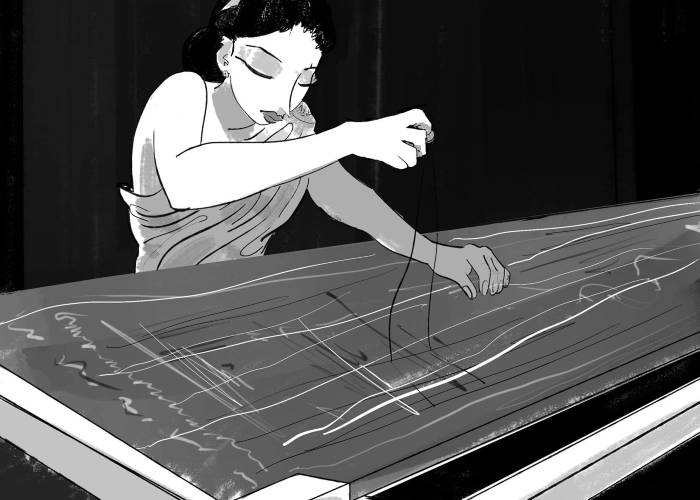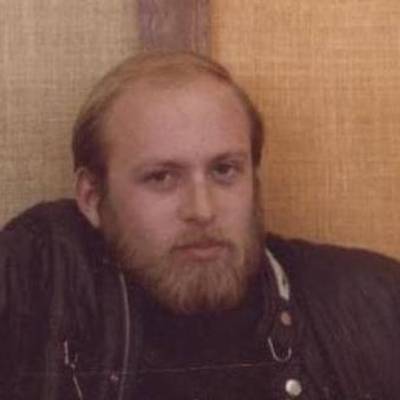
ЗАБВЕНИЕ
Кто-то чертит на черном песке чудные узоры,
Пенье сирен заместилось сплетеньем цветов,
Лотос-цветок на песке зацветает, и шепчут суфлеры:
“Засыпай, спи спокойно, во сне позабудешь свой кров”.
День наступит, и я заживу смеясь, по другому,
День наступал, но слова приносила мне мгла:
“Ты непохож на Улисса, хоть ты и уехал из дому,
И давно Пенелопа покров погребальный спряла”.
OBLIVION
Someone is drawing wondrous patterns on black sand,
The singing of sirens is replaced with a mesh of flowers,
Lotus blooms in the sand, and prompters whisper to me:
“Go to sleep, sleep peacefully, in sleep you’ll forget your home.”
The day will break, and perhaps I shall live again, laughing.
The day came, but the dark mist brought me these words:
“You are not Ulysses at all, although you left your home,
And Penelope has woven the burial shroud for you.”
Translated from Russian by Nina Kossman

Michael Kossman was a poet, prose writer, translator of poetry from English and German, and literary critic. He was born in Moscow, where he graduated from high school and began his university studies. He emigrated from the USSR in 1972. He spent one year in Israel. In 1973, he arrived in the US, first settling in Cleveland where his father had a college teaching job, then in New York. He graduated from Columbia University with a master’s degree in Russian literature. He wrote amazing poems and short stories but was indifferent to publication and refused to publish his work. Unfortunately, most of his best poems and short stories are lost, as he did not want to keep them. He translated poems by W.B. Yeats (from English) and Hermann Hesse (from German) into Russian. He authored studies on Bulgakov’s “The Master and Margarita” and on Zamyatin’s unfinished novel “The Scourge of God”. He was not only a unique poet and short story writer, but also a thinker, and his thinking often verged on the prophetic. He saw life and death so clearly, that in some of his poems written many years ago, he predicted his own death. He passed away on the same night and at the same time as his father, Jan. 22, 2010. After his passing, his sister found an envelope with a few of his poems and arranged for their publication.

Nina Kossman’s nine books include three books of poems, two books of short stories, an anthology she edited for Oxford University Press, , two books of translations of Marina Tsvetaeva’s poetry and a novel. Her work has been translated from English into French, Spanish, Greek, Japanese, Hebrew, Persian, Chinese, Russian, Italian, Danish, and Dutch. Her Russian work was published in Russian periodicals in and outside of Russia. She is a recipient of an NEA fellowship, UNESCO/PEN Short Story award, grants from the Onassis Foundation, the Foundation for Hellenic Culture, etc. Her website is https://ninakossman.com/.
Launched in 2012, “Four Centuries” is an international electronic magazine of Russian poetry in translation.
“The Lingering Twilight” (“Сумерки”) is Marina Eskin’s fifth book of poems. In Russian.
A collection of moving, often funny vignettes about a childhood spent in the Soviet Union.
“Vivid picture of life behind the Iron Curtain.” —Booklist
“This unique book will serve to promote discussions of freedom.” —School Library Journal
A new collection of poems by Ian Probstein. (In Russian)
Young readers will love this delightful work of children’s verse by poet William Conelly, accompanied by Nadia Kossman’s imaginative, evocative illustrations.
A book of poems by Maria Galina, put together and completed exactly one day before the start of the Russian invasion of Ukraine. This is Galina’s seventh book of poems. With translations by Anna Halberstadt and Ainsley Morse.